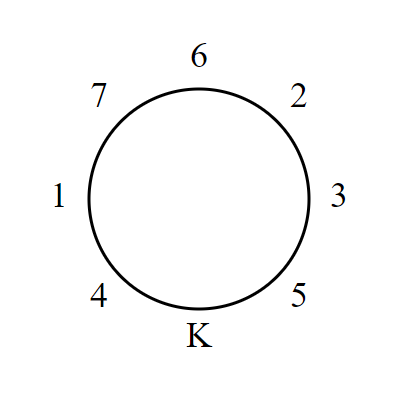Problem 669
The King’s Banquet
The Knights of the Order of Fibonacci are preparing a grand feast for their king. There are $n$ knights, and each knight is assigned a distinct number from $1$ to $n$.
When the knights sit down at the roundtable for their feast, they follow a peculiar seating rule: two knights can only sit next to each other if their respective numbers sum to a Fibonacci number.
When the $n$ knights all try to sit down around a circular table with $n$ chairs, they are unable to find a suitable seating arrangement for any $n>2$ despite their best efforts. Just when they are about to give up, they remember that the king will sit on his throne at the table as well.
Suppose there are $n=7$ knights and $7$ chairs at the roundtable, in addition to the king’s throne. After some trial and error, they come up with the following seating arrangement (K represents the king):

Notice that the sums $4+1$, $1+7$, $7+6$, $6+2$, $2+3$, and $3+5$ are all Fibonacci numbers, as required. It should also be mentioned that the king always prefers an arrangement where the knight to the his left has a smaller number than the knight to his right. With this additional rule, the above arrangement is unique for $n=7$, and the knight sitting in the $3$rd chair from the king’s left is knight number $7$.
Later, several new knights are appointed to the Order, giving $34$ knights and chairs in addition to the king’s throne. The knights eventually determine that there is a unique seating arrangement for $n=34$ satisfying the above rules, and this time knight number $30$ is sitting in the $3$rd chair from the king’s left.
Now suppose there are $n=99\ 194\ 853\ 094\ 755\ 497$ knights and the same number of chairs at the roundtable (not including the king’s throne). After great trials and tribulations, they are finally able to find the unique seating arrangement for this value of $n$ that satisfies the above rules.
Find the number of the knight sitting in the $10\ 000\ 000\ 000\ 000\ 000$th chair from the king’s left.
国王的宴会
斐波那契骑士团的骑士们正为他们的国王准备一场盛大的宴会。骑士共有$n$位,每位骑士都被授予了$1$和$n$之间的不同编号之一。
当骑士们在宴会的圆桌边就座时,他们的座位必须遵循如下特定的规则:座位相邻的两位骑士的编号之和必须是斐波那契数。
当这$n$位骑士试图在有$n$个座位的圆桌边就座时,他们发现,只要$n>2$,无论他们怎么努力,都找不到合适的座位安排。正在他们打算放弃时,他们突然想到,还得给国王在圆桌边安排御座。
假如骑士共有$7$位,因此圆桌边除了国王的御座以外还有$7$个座位。经过一番尝试,骑士们得到了如下的座位安排(其中K代表国王):

注意到$4+1$、$1+7$、$7+6$、$6+2$、$2+3$和$3+5$都是斐波那契数,符合要求。不得不提的是,国王总是希望他左手边的骑士比右手边的骑士编号更小。在这个额外的要求下,上面这个座位安排是$n=7$时唯一的合理安排。在这一安排中,坐在国王左手边第$3$位的骑士编号是$7$。
不久,一些新骑士加入了骑士团,现在有$34$位骑士,圆桌边除了国王的御座外还有$34$个座位。骑士们最终发现,对于$n=34$也同样只有唯一符合要求的座位安排,此时坐在国王左手边第$3$位的骑士编号是$30$。
现在假设总共有$n=99\ 194\ 853\ 094\ 755\ 497$位骑士,圆桌边也有相应数目的座位(除了国王的御座之外)。经过漫长而痛苦的尝试,骑士们终于找到了唯一符合要求的座位安排。
求此时坐在国王左手边第 $10\ 000\ 000\ 000\ 000\ 000$位的骑士的编号。